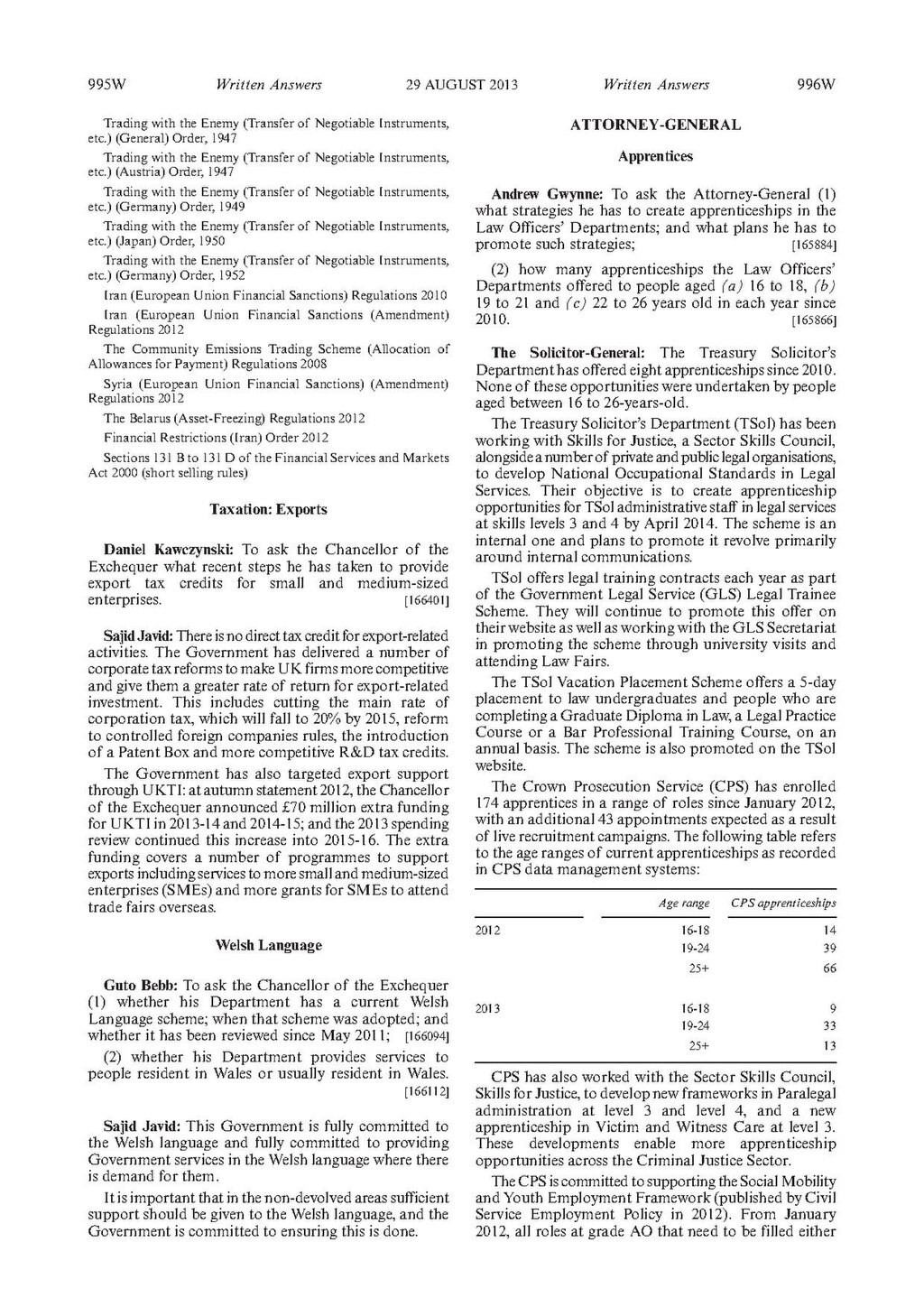Trading with the Enemy (Transfer of Negotiable Instruments, etc.) (General) Order, 1947
Trading with the Enemy (Transfer of Negotiable Instruments, etc.) (Austria) Order, 1947
Trading with the Enemy (Transfer of Negotiable Instruments, etc.) (Germany) Order, 1949
Trading with the Enemy (Transfer of Negotiable Instruments, etc.) (Japan) Order, 1950
Trading with the Enemy (Transfer of Negotiable Instruments, etc.) (Germany) Order, 1952
Iran (European Union Financial Sanctions) Regulations 2010
Iran (European Union Financial Sanctions (Amendment) Regulations 2012
The Community Emissions Trading Scheme (Allocation of Allowances for Payment) Regulations 2008
Syria (European Union Financial Sanctions) (Amendment) Regulations 2012
The Belarus (Asset-Freezing) Regulations 2012
Financial Restrictions (Iran) Order 2012
Sections 131 B to 131 D of the Financial Services and Markets Act 2000 (short selling rules)
Taxation: Exports
Sajid Javid: There is no direct tax credit for export-related activities. The Government has delivered a number of corporate tax reforms to make UK firms more competitive and give them a greater rate of return for export-related investment. This includes cutting the main rate of corporation tax, which will fall to 20% by 2015, reform to controlled foreign companies rules, the introduction of a Patent Box and more competitive R&D tax credits.
The Government has also targeted export support through UKTI: at autumn statement 2012, the Chancellor of the Exchequer announced £70 million extra funding for UKTI in 2013-14 and 2014-15; and the 2013 spending review continued this increase into 2015-16. The extra funding covers a number of programmes to support exports including services to more small and medium-sized enterprises (SMEs) and more grants for SMEs to attend trade fairs overseas.
Welsh Language
Sajid Javid: This Government is fully committed to the Welsh language and fully committed to providing Government services in the Welsh language where there is demand for them.
It is important that in the non-devolved areas sufficient support should be given to the Welsh language, and the Government is committed to ensuring this is done.
ATTORNEY-GENERAL
Apprentices
Andrew Gwynne: To ask the Attorney-General (1)
what strategies he has to create apprenticeships in the Law Officers’ Departments; and what plans he has to promote such strategies;The Solicitor-General: The Treasury Solicitor’s Department has offered eight apprenticeships since 2010. None of these opportunities were undertaken by people aged between 16 to 26-years-old.
The Treasury Solicitor’s Department (TSol) has been working with Skills for Justice, a Sector Skills Council, alongside a number of private and public legal organisations, to develop National Occupational Standards in Legal Services. Their objective is to create apprenticeship opportunities for TSol administrative staff in legal services at skills levels 3 and 4 by April 2014. The scheme is an internal one and plans to promote it revolve primarily around internal communications.
TSol offers legal training contracts each year as part of the Government Legal Service (GLS) Legal Trainee Scheme. They will continue to promote this offer on their website as well as working with the GLS Secretariat in promoting the scheme through university visits and attending Law Fairs.
The TSol Vacation Placement Scheme offers a 5-day placement to law undergraduates and people who are completing a Graduate Diploma in Law, a Legal Practice Course or a Bar Professional Training Course, on an annual basis. The scheme is also promoted on the TSol website.
The Crown Prosecution Service (CPS) has enrolled 174 apprentices in a range of roles since January 2012, with an additional 43 appointments expected as a result of live recruitment campaigns. The following table refers to the age ranges of current apprenticeships as recorded in CPS data management systems:
| &nsbp; | Age range | CPS apprenticeships |
| 2012 | 16-18 | 14 |
| 19-24 | 39 | |
| 25+ | 66 | |
| 2013 | 16-18 | 9 |
| 19-24 | 33 | |
| 25+ | 13 |
CPS has also worked with the Sector Skills Council, Skills for Justice, to develop new frameworks in Paralegal administration at level 3 and level 4, and a new apprenticeship in Victim and Witness Care at level 3. These developments enable more apprenticeship opportunities across the Criminal Justice Sector.
The CPS is committed to supporting the Social Mobility and Youth Employment Framework (published by Civil Service Employment Policy in 2012). From January
2012, all roles at grade AO that need to be filled either